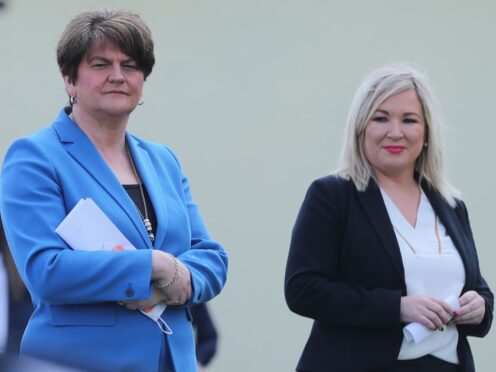
A political row over the closure of schools in Northern Ireland at the outset of the Covid-19 pandemic reflected very badly on the Stormont Executive, Baroness Foster has said.
The former First Minister was pressed on the conduct of a crunch meeting of the ministerial executive on March 16 2020 when there was disagreement on whether to close schools.
Lead counsel to the inquiry Clair Dobbin KC suggested it was “sad and tragic” that ministers were unable to sit down and have a “mature discussion” when it came to a really important decision about children.

“I agree it’s a very bad reflection, very bad,” replied Baroness Foster.
The meeting saw deputy First Minister Michelle O’Neill and other Sinn Fein ministers press for the closure of schools. This was contrary to the then advice of Chief Medical Officer Dr Michael McBride who had said it was not yet the time to shut classrooms.
Baroness Foster said she and other ministers knew school closures would have to come, but she said they wanted to delay that until arrangements for vulnerable children or those in receipt of free school meals had been in put in place.
She told the inquiry that she believed Ms O’Neill and her colleagues broke with what had been a united executive approach up until that point because they wanted to follow the lead of the Irish government, which had announced school closures south of the border a few days earlier.
Ms O’Neill insisted her change of stance was not politically motivated when she gave evidence to the Covid inquiry on Tuesday.
On Wednesday, Baroness Foster was shown a message sent by then head of the Northern Ireland Civil Service, Sir David Sterling, the day after the March 16 meeting in which he suggested the Executive parties were keener on points scoring than helping citizens.
“It was very disappointing that the decision that we had agreed on I think a couple of days before (not to close schools) was then challenged by Sinn Fein ministers because I believe, and I know this has been refuted by the deputy First Minister, that she wanted to be in a similar position to the Republic of Ireland,” she said.
“And whilst we were following what we were being told at that time, and I think doing the right thing in terms of preparing for school closures – but not at that particular point – it descended into ‘them and us’ which is very disappointing.”
Baroness Foster said Ms O’Neill going public with her call for schools to close “accelerated” the number of parents deciding to take their children out of school.
She said a number of schools in the Catholic education sector also announced closures after Ms O’Neill’s statements.
“I think unfortunately when the deputy First Minister decided to go public with her opinion on the closure of schools, some of the schools in the Catholic Maintained sector started to close and therefore it was, to use the Minister of Education’s (Peter Weir) phrase at the time, ‘fraying around the edges’,” said the former First Minister.
“I think that was regrettable because it was important that we had the plans in place to help those young people who we knew weren’t going to be back in school for a considerable length of time.
“That was made clear to us that once you closed schools, schools were going to be closed for a long time. And we were very conscious of the fact that not every child has access to technology, not every child has a safe home environment, and we were concerned about that at the time.”
She added: “We all were by this stage becoming very afraid. People, understandably, were keeping their children at home because they didn’t know what way the virus worked, who it impacted the most and therefore they were keeping their young people at home.”

Enjoy the convenience of having The Sunday Post delivered as a digital ePaper straight to your smartphone, tablet or computer.
Subscribe for only £5.49 a month and enjoy all the benefits of the printed paper as a digital replica.
Subscribe